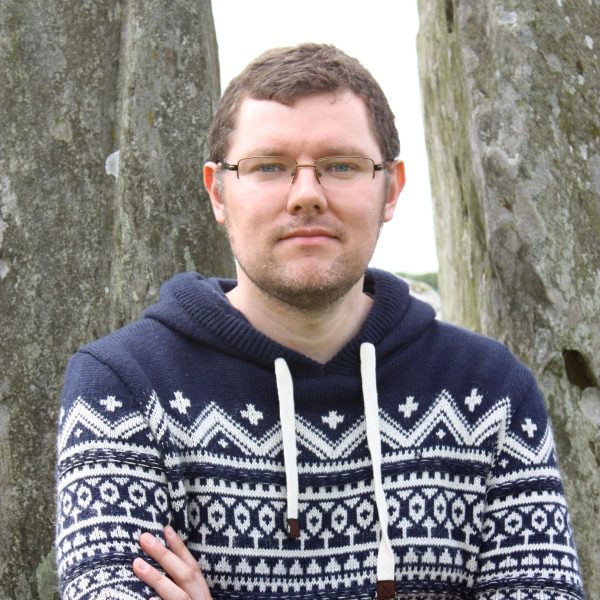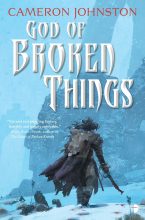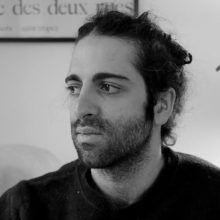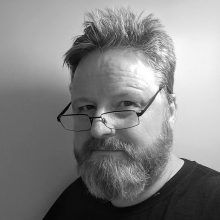God of Broken Things by Cameron Johnston
What led you into writing?
When I was young, my parents used to take me out on a lot of day trips to visit castles and other historical sites, and to places like Loch Ness (never did glimpse the monster…), and when you add that to being a library kid, coming out with arms full of books every other week, that really encouraged my imagination. I think perhaps that it was Dragonlance that really kicked off my love of fantasy, and I was also a big fan of old swords and sorcery films like Hawk the Slayer, Krull, Dragonslayer etc and Hollywood medieval flicks like The Black Shield of Falworth, all of which made me want to make up my own stories.
I pottered about doing bits and pieces, and even finished two novels (one fantasy and one urban fantasy, neither of which will ever see the light of day) before I decided to take things more seriously. About ten years ago I decided to ‘get good’ and work hard at it, and joined a local writers group to level up my writing skills using short stories in an epic training montage before writing my first publishable novel: The Traitor God.
How does a typical day look?
I am not one of those few authors lucky enough to be able to afford to write full time (Yet, but a guy can dream…), so I have a rather busy day job during the week and writing just has to be fitted in wherever it can. I’m not the fastest writer in all the land, and I don’t believe you have to write every single day to finish off a novel so my weekly word count is variable depending on what else I want or have to do, but if you do some writing at the weekend and in the evenings or mornings then it all adds up.
In what ways do your characters test your abilities?
It’s a tricky thing to create a character wildly different from yourself and then to try to inhabit their mindset to make it feel authentic. The old moustachioed twirling villain trope is old hat now, and a boring character once you realise there is little nuance there. Conflicted and complex characters are something I find far more interesting to write, but it does make it more difficult when you have to sit inside their head and wonder which way they will jump. When I wrote Edrin Walker in The Traitor God I gave him mind-controlling magic, and that is a horrific power when you really think about it – every one of us would be tempted to use that power now and again, and it’s a slippery slope he has to consciously try and avoid falling too far down.
What’s your setup?
Nothing exotic here: I like a desktop PC at a nice wooden desk as opposed to a laptop, and I have a 27” monitor so I can have multiple pages up on screen at once instead of having to scroll up and down a lot. I use Word to write and don’t require anything more extensive. I have a few cool things close to hand if I need to fiddle with them and sit back and take stock of where the story is taking me next – there is nothing worse than staring at a blank screen to make you feel like a talentless hack, but I find having something physical in my hands can sometimes help.
What lasting effects have your favourite authors had on your writing and style?
I think their influence all goes into a big old blender and mixes together well.
Let’s start with David Gemmell, who taught me the benefits of a little light in the darkness of even the most evil heart, and of hope and the joys of morally grey characters.
HP Lovecraft’s cosmic horror and deepening dread really struck a chord with me, and I find that sense of unknowably ancient history beneath unwitting human feet makes its way into my worldbuilding.
Robert E Howard’s Conan taught me the joys of savage adventure in strange lands filled with ancient ruins, magic and monsters, and that characters do not have to be admirable or even nice, but they should be interesting.
What do you do for inspiration?
I read widely in a variety of genres and mediums, from fantasy novels to historical fiction, graphic novels, comics and manga. Watch films, TV shows and anime as well as documentaries. Read non-fiction such as archaeology and history books. Play computer games and tabletop RPG.
When my creativity ebbs low or I feel stuck in the mud, I have some swords, Roman coins, a medieval arrowhead and chainmail segment, Iron Age floor tiles, an Egyptian scarab and parts of meteorites close to hand – and if I hold them I suck in all that history and it takes my mind back to the olden times and where these objects might have been, and I find that feeds my imagination.
What repeating themes do you find yourself pulling into your stories?
I really love to put in some ancient mysteries, forgotten ruins of vanished civilisations, crumbling temples and creepy magic. I also tend to write about morally ambiguous characters, some who are selfish and others who are generally good people but have to make unpleasant and hard decisions.
How do you wind down?
Other than the staples of films and books, I really appreciate good board game – I would recommend Catan, Carcassonne, Seven Wonders, Citadels, Pandemic, Agricola, Takenoko, Jaipur and Splendor. It does me good to get away from screens to play with something physical. I also like to unwind by getting out into nature for forest walks.
What sort of challenges do you regularly overcome while world-building?
When you introduce magic into a setting, it throws everything else out of whack. Everything needs to change: from military tactics, household security, construction, to waste disposal and health care, and all of that takes some real thought to fit the world and magic together. Sometimes I also find keeping track of distances and travel time can be a real pain in the neck.
What are you reading at the moment?
We Are The Dead by Mike Shackle – it is a most excellent dark and gritty fantasy, and I would highly recommend it.
What’s the most useful advice you could give to an aspiring author?
Ye gods and little fishes, the one most useful thing? Well, if I have to pick one thing, it would be around how an aspiring author treats their rough draft. So many people look at their writing and feel bad about it and then stop – don’t do that! Many a published author writes a really bad first draft, full of typos, clunky sentences etc. Finish your story first, and then the real magic comes in when you get to work editing and rewriting. It takes several drafts and a lot of time to polish a story up, so don’t despair if it’s not immediately the best thing ever. The one thing that every author I know has in common is perseverance.
Tell us about the book you’re promoting.
God of Broken Things is book two of The Age of Tyranny duology, following on a few months from the apocalyptic events of The Traitor God. It’s a dark and dangerous blood-soaked race to thwart an invasion threatening to sweep away what is left of the city of Setharis, and the Arcanum of magic users that rule it.
The tyrant Edrin Walker has embraced his mind-controlling power and is changing, physically, mentally and magically. No longer a wastrel magus on the run, he is taking a stand and rides out at the head of a small army to confront the ancient evils that threaten to tear apart his world. Deep in the snowy Clanholds, he confronts his past, and fights to keep his own terrible powers from turning him into the tyrant everybody always feared he would become.
👋 Hi! I run Author Interviews
As a new writer I found myself itching to contribute to a thriving, creative community, so I made Author Interviews and I've met loads of wonderful people in the process. You can buy my debut fantasy RINGLANDER: THE PATH AND THE WAY from Amazon.


 Audible
Audible


